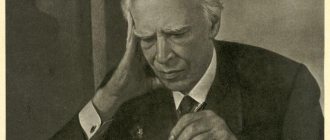Foundation of the Moscow Art Theater
In 1898, at the age of thirty, Konstantin Sergeevich, together with Nemirovich-Danchenko, founded the new Moscow Art Theater. They are faced with the acute question of reforming the performing arts. And Stanislavsky begins to create his famous System, the goal of which is to obtain the “truth of life” from the actors. The super task, the main idea of this theory, required not to play the role, but to completely get used to it. The assessment of the actors’ work during rehearsals was the phrase that Stanislavsky threw out: “I don’t believe it.” Documentary footage of such a run-in of the role has been preserved. There is a rehearsal for the play “Tartuffe,” Konstantin Sergeevich’s latest production, and he gives advice to the theater actress V. Bendina, who plays Dorina, to lie on stage, as she herself would lie in life. Unique shots. The year is 1938, the year of the death of the brilliant director. Even Nemirovich-Danchenko, with whom relations were completely severed for many years (their friendship and enmity are very well described in M. Bulgakov’s “Theatrical Novel”), said the famous phrase: “Orphans.” Stanislavsky died. No one else said “I don’t believe it” to the actors.
Memory of the director
Alekseevs is a surname known in Tsarist Russia. His father was a major industrialist, his cousin was a Moscow mayor, the family was related to the Tretyakovs and Mamontovs, famous philanthropists. This was truly the “flower of Russia,” which, as we know, did not have its own prophets. One can only wonder how a representative of the nobility and industrial elite managed to avoid persecution. However, he received all state awards, the title of academician and people's artist. Streets in dozens of cities are named after him, commemorative medals have been issued, and there are awards named after him - the MIFF “I Believe” award. Konstantin Stanislavsky." There have been seasons named after him for several years now. These are theater festivals that bring the world's best performances. The unforgettable phrase of people who question something: “I don’t believe what Stanislavsky said,” has become popular. Its first part, said separately, sounds rude and even insulting. But when combined with the surname, it caresses the ear with tolerance and hints at the erudition of the interlocutor.
The extraordinary talent of Stanislavsky
As a talented person, Konstantin Sergeevich was talented in everything. In his youth, he worked for quite a long time at his father’s factory and rose to the rank of director. The products manufactured by the enterprise were not far from the world of beauty - they produced the finest gold and silver wire - the basis for the production of brocade. All evenings were devoted to amateur acting at the Alekseev Theater. Stanislavsky, as is obvious, got his love for acting and talent from his grandmother, the French artist Marie Varley. Later, Konstantin Sergeevich studied plastic arts and vocals and sang well. One of the best musical theaters in the country bears his name and the name of Nemirovich-Danchenko. The famous talented theorist and reformer of stage art, Stanislavsky was a very gifted actor. A number of his famous roles have entered the global collection of acting works (for example, The Old Man). He was noticed from the first professional productions. However, in 1916 he completely stopped his artistic activities. An exception was made only once - forcedly, during the theater's tour abroad. For everyone, the abrupt cessation of performances on stage, after brilliant rehearsals, including the dress rehearsal, remained a mystery. It was the role of Rostanev from Dostoevsky’s “The Village of Stepanchikovo,” which he worked on for a year. We have to assume that Konstantin Sergeevich first uttered such a later-famous phrase, addressing himself: “Stanislavsky, I don’t believe it.” But he did not give up directing and scientific work until the end of his life. After his death, one of the best theaters in the world, his famous System, his school of theatrical excellence, talented students and brilliant books remained. And the phrase remained forever, a symbol of doubt about something or distrust - “I don’t believe it.”
Secrets of mastery
But the school remained, the System of Konstantin Sergeevich remained, which formed the basis of Russian theatrical mastery. Its postulates are fully described in the books “My Life in Art” and “An Actor’s Work on Oneself.” The rehearsals themselves for two famous Moscow Art Theater performances were described in detail by the theater’s most talented actor, Toporkov, and represent vivid documentary evidence of the director’s work with the performers.
The performance of no American actor can compare in intensity of passion and truthfulness with the skill of Russian artists, dead and living, such as Plyatt, Popov, Makovetsky, Efremov. They just have different super goals. Most TV series, both foreign and domestic, are not discussed at all. In this case, it’s even too lazy to say the phrase: “As Stanislavsky said, “I don’t believe it”,” because it still refers to “high art,” whether the actors play well or poorly.
“I don’t believe it!”: main quotes from Konstantin Stanislavsky
He was an actor and director, a theorist and reformer of the theater business, he founded the Moscow Art Theater and created a system of acting art, which is named after him.
“There are no small roles, there are small actors.”
“An actor must learn to make the difficult familiar, the familiar easy, and the easy beautiful.”
“Good scenery is a salvation for amateurs. How many acting sins are covered up by picturesqueness, which easily gives the whole performance an artistic touch! It’s not for nothing that so many acting and directorial mediocrities are strenuously hiding on stage behind scenery, costumes, colorful spots, stylization, cubism, futurism and other “nemes”, with the help of which they try to shock an inexperienced and naive viewer.”
Konstantin Stanislavsky, 1912.
“When you play a good man, look for where he is evil, and in evil, look for where he is good.”
“He thought he was a complete actor, but it turned out he was a complete actor.”
"Theater begins with a hanger."
“There is only one reason for an actor not to appear at a performance - death.”
“A house is built brick by brick, and a role is built by small actions.”
“Playing in front of a full and sympathetic audience is the same as singing in a room with good acoustics. The viewer creates, so to speak, spiritual acoustics. He receives from us and, like a resonator, returns to us his living human feelings.”
“This is the law of cheap, provincial theater - to jump up from your seat at every winning phrase. In the old days, actors would say: “Oh, and I’ll give a candle to this phrase,” that is, I’ll jump so much that the whole audience gasps! Well, some grasshoppers were jumping on stage! Who is taller, who will jump faster!”
“Art is a reflection and knowledge of life; Without knowing life, you cannot create.”
“What is talent? - Soul".
“Love the art in yourself, not yourself in the art.”
“You need to write for children the same way as for adults, only better.”
“There is no art that does not require virtuosity, and there is no final measure for the completeness of this virtuosity.”
About life
“Every day on which you have not supplemented your education with at least a small, but new piece of knowledge for you... consider it fruitlessly and irrevocably lost for yourself.”
“First make sure, and then convince.”
“While we are young, we should arm ourselves with a toothbrush and go wherever our eyes lead us. Laugh, do crazy things, cry, go against the system, read as much as you can’t seem to fit into your head, love as much as you can, feel. Just live".
[edit] See also
- Huita
- O RLY?
- Lies, bullshit and provocation
| [ + ] "I do not believe!" - encourages the interlocutor to action. | |||||||||||||||
| |||||||||||||||
“Stalin took Russia with a plow and left with an atomic bomb,” Winston Churchill
Another famous phrase, this time not from Stalin, but about Stalin. Indeed, Winston Churchill regarded the Soviet leader with both apprehension and respect, as reflected even in the Fulton speech that launched the Cold War: “I deeply admire and honor the gallant Russian people and my wartime comrade, Marshal Stalin.”
Article on the topic
Operation Long Jump. Who wanted to steal Stalin?
But Churchill said nothing about the plow and the atomic bomb. For the first time, Stalinist Nina Andreeva cited it as a quote from Churchill in the article “I Can’t Give Up Principles” in March 1988 .
Andreeva's inspiration may have been a 1956 Encyclopedia Britannica article about Stalin. The author of the article, Sovietologist Isaac Deutscher , wrote: “The essence of Stalin’s truly historical achievements is that he took Russia with a plow, and left it with nuclear reactors. He raised Russia to the level of the second industrialized country in the world.”
How to destroy America? Chief's Council
Soviet leader Joseph Vissarionovich Stalin unexpectedly intervened in the 2021 election campaign in the United States. The “culprit” of this event was Republican presidential candidate Ben Carson.
Related news: US presidential candidate attributed a phrase to Stalin that he did not say. During a televised debate, Carson said: “Joseph Stalin said that if you want to destroy America, you need to destroy three things - our spiritual life, our patriotism and our morality.” .
Very quickly, viewers and Internet users discovered that the presidential candidate cited words that Stalin never actually said. After this, hundreds of ironic comments rained down on Carson.
The most curious thing is that the quote given by Ben Carson is well known to the Russian audience - it is cited, but only in reverse translation in relation to Russia, either as part of the so-called “Dulles plan” or as a statement by Zbigniew Brzezinski . Some even attribute it to Otto von Bismarck .
In fact, neither Stalin, nor Bismarck, nor Brzezinski, as well as other prominent figures of different eras, have anything to do with this phrase. The most similar statement is found in the hero of the novel by writer Anatoly Ivanov “Eternal Call”, a former Russian gendarmerie officer, and at the time of the statement - SS Standartenführer Lakhnovsky.
Article on the topic
Answer for the market. Famous Aphorisms Attributed to the Wrong Authors The incident that happened to Ben Carson is not that rare. Thanks to the Internet, the replication of loud statements and aphorisms of famous people who actually did not say anything like that has become widespread.
The leader of the Russian revolution, Vladimir Ilyich Lenin, wrote about this: “The main problem with quotes on the Internet is that people immediately believe in their authenticity.”
If you were confused by the historical proximity of Lenin and the Internet, then you can be congratulated - of course, he did not write anything like that. However, this phrase, launched by someone as a mockery of fake quotes, is now taken at face value by many citizens who are not too savvy in historical matters.
AiF.ru has collected several examples of famous statements by the powers that be, which they actually never said.
Article on the topic
Andrei Sidorchik: Stalin will never leave
I believe!
"I do not believe!" - the most famous phrase of Konstantin Sergeevich Stanislavsky. You can find a lot of theatrical legends connected with her in one way or another. Here’s one: actor Nikolai Massalitinov was once so tormented by Stanislavsky’s remarks that he asked Konstantin Sergeevich to play the episode himself, and at the same time repeated incessantly: “I don’t believe it!” But Stanislavsky was not offended, and in general he believed that these were just rumors, and in fact he does not use his signature “I don’t believe it!” very often. Stanislavsky also said that he pronounces these words “not on his own behalf,” but on behalf of a simple spectator of the 20th or 30th performance, who does not believe in what is happening on stage, in what the actor is saying. And only in this case, said Stanislavsky, “on behalf of my neighbor, the viewer, I throw out to you, as a director, the remark “I don’t believe it!” And he added: “Accept my “I don’t believe you” calmly, businesslikely... trustingly!” - and asked forgiveness for the bad pun.
Stanislavsky's anniversary - the 150th anniversary of his birth - was celebrated throughout last year. Of course, conferences were held, some on such a scale that they even embarrassed their Western colleagues, who were accommodated in five-star hotels, which, of course, was pleasant; it’s a pity that the scientific scope was much more modest.
Having been using the discoveries, terms and works of Stanislavsky for almost a hundred years now, those who could, and therefore should have done this, nevertheless did not bother to prepare and publish a complete academic collection of his works. The Soviet government, which strangled Stanislavsky in its hedgehog embrace, was replaced by the era of market relations, in which K.S. became a convertible currency. The larger the figure of the founder, the more profound the benefits.
Overseas, we confidently talk about the greatness of genius. And here?
And here, a professor crowned with gray hair and laurels, who has devoted a significant part of his life to the deep and honest study of Stanislavsky’s legacy, recklessly gives an interview to his best student over a dictaphone, in which he categorically asserts (to the glee of the interviewer) that “there is no System”, that Stanislavsky’s book “Work actor above himself” is no good that Nemirovich-Danchenko was a bad writer, by the way, as uneducated as Stanislavsky, and in general, it turns out that Nemirovich had other merits... I’ll have to quote, may Vladimir Ivanovich forgive me: “At the age of 15 he had an adult woman and could not only satisfy her, but even support her.”
Of course, if you so decisively renounce your own wealth, which is still, however, convertible abroad, you can call the main event of last year the publication in Russian of Hans-Thiess Lehmann’s book “Postdramatic Theater”, which, in terms of scientific value, I think, would most likely be compare with the collections of ancient weapons that many provincial collectors were proud of in the century before last, proudly leading guests to the musket of Ivan the Terrible or the sword of Tamerlane... By the way, they were also believed. Of course, not all.
One Moscow businessman, who some time ago decided to create a virtual museum space dedicated to Stanislavsky in his business center, turned to famous London museum designers. They, in turn, asked to highlight ten main points - the main thing in Stanislavsky. This list also included the following item: “I was honest in everything, I never let my business comrades down.” And this is true.
“When I hear the word ‘culture’, my hand reaches for a pistol” - Joseph Goebbels
The main propagandist of the Third Reich really did not favor those manifestations of culture that did not fit into Nazi ideology. Perhaps he would even subscribe to this statement, like Hermann Goering , who is sometimes also credited with the authorship of these words. But the truth is that neither Goering nor Goebbels said anything like that.
Article on the topic
Controversial choice. Goebbels' book was published in the series "Prose of the Greats"
In fact, the phrase is taken from Nazi playwright Hans Jost Schlageter, dedicated to a German World War I veteran who, after the Allied occupation of the Rhineland, continued to blow up French trains. In the play, Schlageter discusses with his friend whether it is worth spending time on studying if the country is under occupation. The friend replies that it is better to fight than to study and that at the word “culture” he releases the safety of his Browning.
“No man, no problem” - Joseph Stalin
It is not known what the Soviet leader would have said upon hearing this saying - perhaps he would have nodded his head approvingly, or perhaps he would have twirled his finger at his temple. In any case, there is no reliable evidence that Stalin ever said such a phrase.
In fact, the phrase was coined and attributed to Stalin by the writer Anatoly Rybakov in the novel “Children of the Arbat.” They say that the author heartily made fun of publicists and politicians who in their speeches cited this phrase as truly Stalinist.
Article on the topic
Born of a revolution. History of the French guillotine
“We don’t have irreplaceable people,” Joseph Stalin
And one more phrase attributed to the Generalissimo, but not his. In 1942, it was used in the play “Front” by playwright Alexander Korneychuk . But he is not its author either. The words actually belong to the commissar of the French revolutionary Convention, Joseph Le Bon , and were spoken in 1793. Viscount de Gizelin , arrested for political unreliability, asked to spare his life, since his education and experience could still be useful to the new France. To which Commissioner Le Bon replied: “There are no irreplaceable people in the Republic!” The commissioner turned out to be right - soon after the viscount he himself went to the guillotine.
“The Franco-Prussian War was won by a German schoolteacher” - Otto von Bismarck
Otto von Bismarck said a lot during his life that later turned into aphorisms. But, in addition to Bismarck’s actual words, there are many that are mistakenly attributed to him.
The author of the statement is Bismarck's contemporary, geography teacher Oskar Peschel . The words that appeared in a newspaper article in the summer of 1866 referred not to the Franco-Prussian War, but to the Austro-Prussian War: “When the Prussians beat the Austrians, it was a victory for a Prussian teacher over an Austrian schoolteacher.”
“Any cook can rule the state” - Vladimir Lenin
Since the late 1980s, this phrase has been actively used by critics of the Soviet system and socialism in general. Without entering into a debate about whose ability to govern the state is higher - a Russian cook of the early 20th century or a Russian deputy of the early 21st century, it must be said that Lenin did not utter such words.
Article on the topic
Lenin's plan - the victory of the cook In this case we are talking about a deliberate distortion of Lenin's real phrase.
In October 1917, in the article “Will the Bolsheviks retain state power?” Lenin wrote: “We are not utopians. We know that any unskilled worker and any cook are not capable of immediately taking over the government of the state. On this we agree with the cadets, and with Breshkovskaya , and with Tsereteli .
But we differ from these citizens in that we demand an immediate break with the prejudice that only the rich or officials taken from rich families are able to govern the state, carry out the everyday, daily work of government. We demand that training in public administration be conducted by class-conscious workers and soldiers and that it begin immediately, that is, all working people, all the poor, immediately begin to be involved in this training.” As you can see, Lenin’s original phrase has a completely different meaning.
Article on the topic
Two-faced Saltykov-Shchedrin. How an exemplary official became an exemplary satirist
“Don’t spare the soldiers, the women are still giving birth!” — Marshal Georgy Zhukov
Among critics of the leadership talents of Marshal Zhukov, as well as among fans of the version that the Red Army “bombarded the Wehrmacht with corpses,” this quote is very popular.
Article on the topic
The Last Empress.
Why in Russia they didn’t like the wife of Nicholas II The problem is one thing - Zhukov never uttered it. Alexander Suvorov, Mikhail Kutuzov and Emperor Peter the Great , to whom it was attributed at different times,
did not pronounce it It is not known for certain how and when this phrase originated. Something similar can be found in a letter from Empress Alexandra Feodorovna to Nicholas II , dated August 17, 1916: “The generals know that we still have many soldiers in Russia, and therefore they do not spare lives, but these were superbly trained troops, and everything is in vain.” .
Article on the topic
“Stupidity is a gift from God.” 11 most striking quotes and aphorisms of Otto von Bismarck









